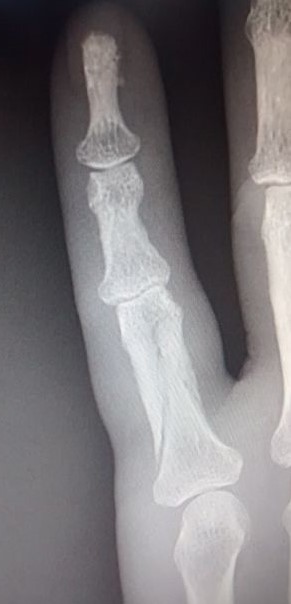This post is taking a little longer to write than usual as my touch typing is somewhat hampered, having broken my little finger 2 weeks ago. Learning the Alexander Technique leads to many benefits, including greater self-awareness and better balance. So what’s an Alexander teacher doing breaking her finger? And, why am I quite so grateful to the Alexander Technique at this moment?

I was out walking by the sea with a friend, when I ended up having to climb down a sea defence barrier to get nearer to my dog who had wandered ahead out of earshot. I’ve happily clambered up or down these massive boulders several times before – I’m no climber but I do love scrabbling around. Knowing that everything was very wet from recent rain, I was actually looking forward to the mini challenge of navigating myself safely down. However, halfway through, I allowed myself to be momentarily distracted when my friend called out to me – ironically to ask how was I going to manage the bottom section which was covered in seaweed? As I looked up to answer I wasn’t paying attention to the step I was then taking and I soon realised that my foot was rapidly sliding underneath me.
Probably everyone has had the experience of time appearing to slow down as an accident unfolds. What the Alexander Technique offers in such a situation is the ability to avoid simply going into panic or freeze mode but instead to give yourself time to figure out how best to respond in the moment. So when I first realised that I was slipping, I knew how I could allow myself to descend fairly smoothly and safely. However, as I was coming gently into contact with the rock underneath me, I realised that now my whole body was sliding on the slippery rocks and I was heading towards a large gap between the boulders. Falling down there could easily result in my head banging against the rock walls, so I threw my arm out to stop myself. No harm done except for my little finger which immediately began to throb insistently. Assuming it was just a sprain and stupidly feeling rather embarrassed, I didn’t tell my friend that I’d hurt myself. Later on though, my partner made me go to the minor injuries unit and I was shocked to see the x-ray of my finger with a very obvious fracture.
My finger is recovering really well and I’ve been musing on how different everything would have been without the Alexander Technique. Of course I can’t know for sure, but I think it’s very likely I would have ended up with a worse injury. I certainly would have felt a real flash of fear while falling and tightened every muscle in my body – a reaction which is more likely to lead to injury (we’ve all heard about someone who has fallen over when drunk without hurting themselves because they were so relaxed). But perhaps more interesting than this is my attitude after the event, which has been very different to my pre-Alexander days. In fact, the reason I first began Alexander lessons all those years ago was fear about my future long-term health because of a family history of back and neck problems. All my life I’d perceived myself as primarily a thinking mind, with very little awareness of my body, which almost seemed ‘other’ to me. In those days if I’d broken a finger I would have spent my time worrying about whether it would heal properly and whether I’d end up with osteoarthritis in the long term. It wouldn’t have occurred to me that I had any real role to play in my own recovery. Now I have a better understanding of myself and more confidence in the natural healing process. What’s more, I know how to use my Alexander thinking to help this process along. On a practical level, I have a good sense of what activities will be ok for me to do, rather than my previous attitude of just being scared that I might make the injury worse by inadvertently doing something I shouldn’t. So, through my Alexander training, I’ve gone from a position of fear to one of self-confidence.
Training in the Alexander Technique certainly doesn’t make you invincible but it does give you the means to take better care of yourself. I’m sure that, compared with how one was before, the overall risk of injury must be reduced when one is more self-aware, more present and more in balance, more of the time. This will be true across many areas – whether it’s falling, doing DIY, or just ‘overdoing it’ during exercise.
So, through the Alexander Technique I’ve gained confidence in being better able to avoid an accident from happening, in responding appropriately in the event that it does, and in recovering from it afterwards. Of course one doesn’t want to be over-confident – after all, they do say that pride comes before a fall!

